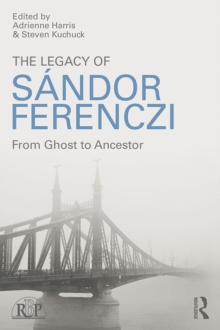
The Legacy of Sandor Ferenczi : From ghost to ancestor EPUB
Edited by Adrienne Harris, Steven Kuchuck
Part of the Relational Perspectives series
EPUB
Description
Winner of the 2016 Gradiva Award for Edited Book
The Legacy of Sándor Ferenczi, first published in 1993 & edited by Lewis Aron & Adrienne Harris, was one of the first books to examine Ferenczi’s invaluable contributions to psychoanalysis and his continuing influence on contemporary clinicians and scholars. Building on that pioneering work, The Legacy of Sándor Ferenczi: From Ghost to Ancestor brings together leading international Ferenczi scholars to report on previously unavailable data about Ferenczi and his professional descendants.
Many—including Sigmund Freud himself—considered Sándor Ferenczi to be Freud’s most gifted patient and protégé.  For a large part of his career, Ferenczi was almost as well known, influential, and sought after as a psychoanalyst, teacher and lecturer as Freud himself. Later, irreconcilable differences between Freud, his followers and Ferenzi meant that many of his writings were withheld from translation or otherwise stifled, and he was accused of being mentally ill and shunned. In this book, Harris and Kuchuck explore how newly discovered historical and theoretical material has returned Ferenczi to a place of theoretical legitimacy and prominence. His work continues to influence both psychoanalytic theory and practice, and covers many major contemporary psychoanalytic topics such as process, metapsychology, character structure, trauma, sexuality, and social and progressive aspects of psychoanalytic work.
Among other historical and scholarly contributions, this book demonstrates the direct link between Ferenczi’s pioneering work and subsequent psychoanalytic innovations. With rich clinical vignettes, newly unearthed historical data, and contemporary theoretical explorations, it will be of great interest and use to clinicians of all theoretical stripes, as well as scholars and historians.
Information
-
Download - Immediately Available
- Format:EPUB
- Pages:300 pages
- Publisher:Taylor and Francis
- Publication Date:17/04/2015
- Category:
- ISBN:9781317590781
Information
-
Download - Immediately Available
- Format:EPUB
- Pages:300 pages
- Publisher:Taylor and Francis
- Publication Date:17/04/2015
- Category:
- ISBN:9781317590781










